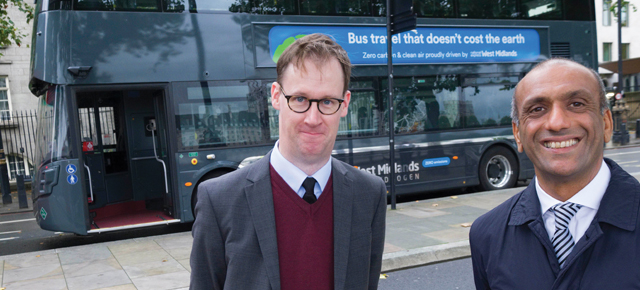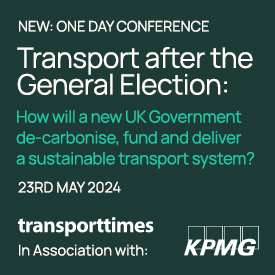Treasury announces additional £355m of funding for zero emission buses, but the bus industry says pledge to deliver 4,000 vehicles is still at risk

The bus industry welcomed news of additional funding for transport schemes in this week’s Autumn Budget, but called for a clear roadmap for decarbonisation of the national bus fleet.
The Treasury has dedicated a further £355m of new funding for zero emission buses. It has also allocated £70m under the ZEBRA (Zero Emission Bus Regional Areas) scheme to five locations – Warrington, Leicester, Milton Keynes, Kent, and Cambridgeshire & Peterborough.
Last week saw the UK’s three bus manufacturers join forces to urge the government to accelerate its planned rollout of 4,000 new UK-made zero emission buses. Alexander Dennis, Switch Mobility and Wrightbus held a ‘park the bus’ event in Westminster to make their point. Prime minister Boris Johnson and transport secretary Grant Shapps promised in February 2020 to deliver these 4,000 buses by 2025, but only 50-100 are on the road.
Together with the ZEBRA and All Electric Bus Town schemes, government funding for up to 900 buses had been made available period to this week’s budget. The £355m announced this week should help acquire around 1,500 vehicles and associated infrastructure.
The Bus and Coach All-Party Parliamentary Group invited the three bus manufacturers to park three UK-made zero emission buses in Westminster on October 20, demonstrating the technology to MPs and reminding Downing Street of its commitment.
A letter delivered by the Bus and Coach APPG, which is chaired by former transport minister Robert Goodwill, to Number 10 explained: “The UK has three world-leading bus manufacturers who have all invested in R&D to develop market-leading zero-emission buses (ZEBs) and stand ready to deliver on your government’s commitment to introduce 4,000 ZEBS by 2024/5. However, from our discussions with the manufacturers, we understand there remains frustration by the slow progress that is being made in turning government words into bus production orders.”
These frustrations remain despite this week’s Treasury announcement. A statement issued by the Confederation of Passenger Transport on budget day said: “The funding announced today for zero emission buses gives a welcome immediate boost to bus manufacturing. Beyond this year, however, the scale of funding raises serious questions over the speed at which the prime minister’s five year plan to deliver 4000 zero emission buses can be delivered.”
Martin Dean, managing director, business development at The Go-Ahead Group, Britain’s largest operator of electric buses, said: “Buses are a green mode of transport and with COP26 looming, we’re glad that the government is committing more funding to electric vehicles.”
This is a once in a generation shift in transport technology – and that means a clear long-term roadmap is needed for decarbonisation of the national bus fleet
But he added: “This is a once in a generation shift in transport technology – and that means a clear long-term roadmap is needed for decarbonisation of the national bus fleet.”
In an interview in Destination Net Zero: Decarbonising Transport, Alexander Dennis president and managing director Paul Davies expressed his concern that ministers may not appreciate the industry’s need for a constant pace: “2024 may sound far away but bus manufacturing isn’t a tap we can simply turn on and off. The underlying manufacturing capacity of the established UK bus manufacturers is much less than it used to be and the danger is that a bow wave of demand may force government investment offshore at a time when it is critical that we grow the country’s clean tech sector that will deliver the decarbonisation objectives.
Pushing back orders to future years creates a situation where you are trying to squeeze two pints into a one-pint pot
“We’re doing what we can here at Alexander Dennis to be as flexible as possible under what are incredibly challenging times for anyone involved in manufacturing, but pushing back orders to future years creates a situation where you are trying to squeeze two pints into a one-pint pot.”
Commenting prior to this week’s budget statement, Campaign for Better Transport also called for more to be done to deliver a zero-emission bus fleet. Of the 38,000 buses nationally, the transport charity pointed out that only 12% are hybrid and only 2% (4% in London and 1% in the rest of England) are zero emission according to the latest figures..
This article appears in the latest issue of Passenger Transport.
DON’T MISS OUT – GET YOUR COPY! – click here to subscribe!







